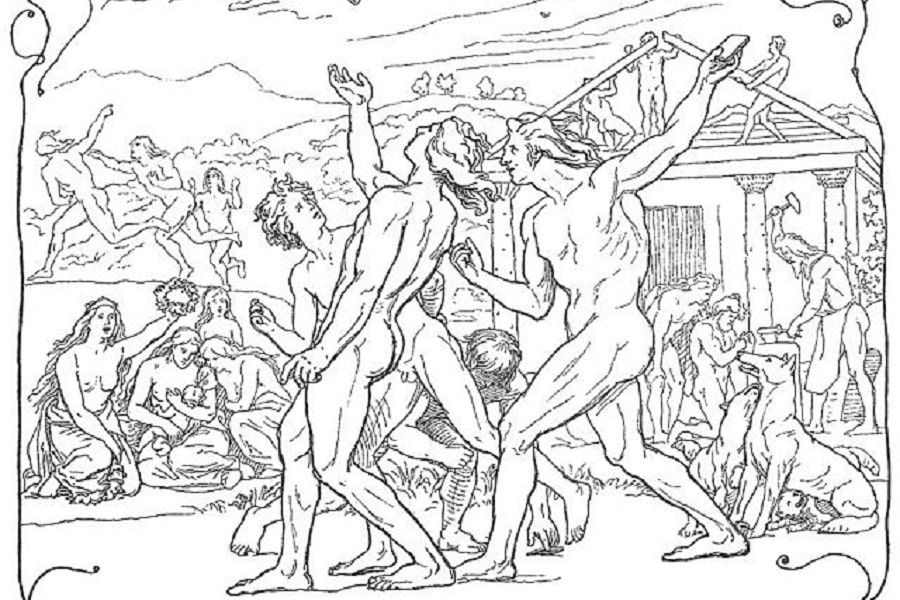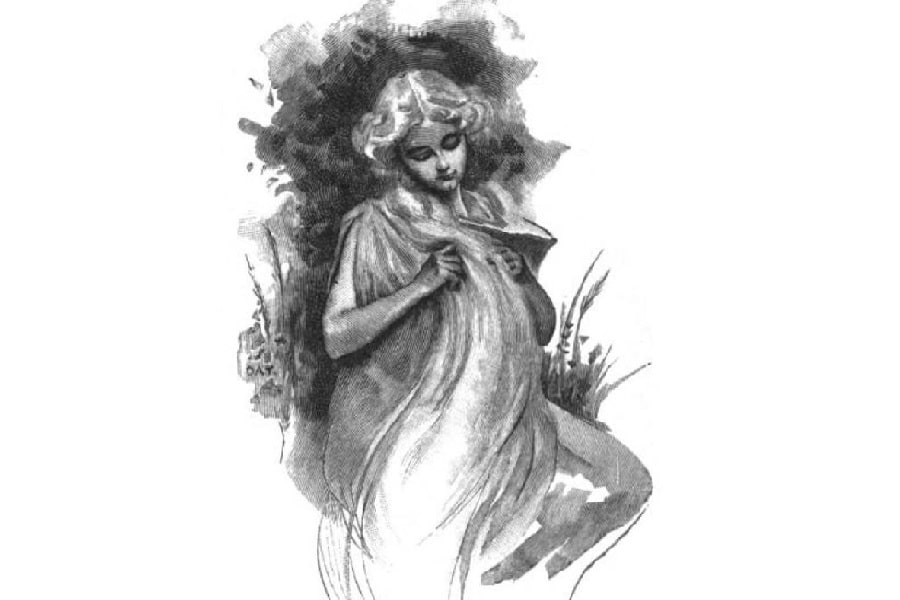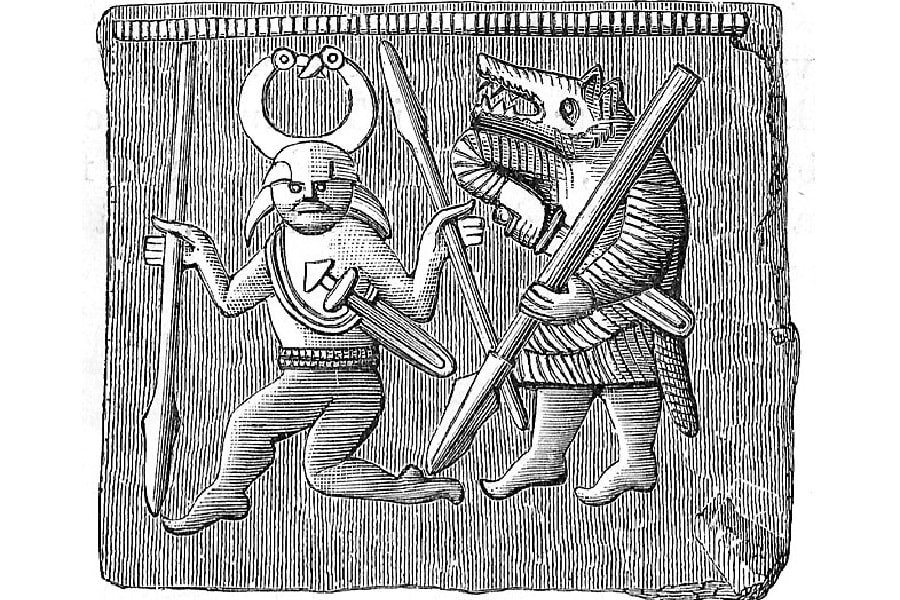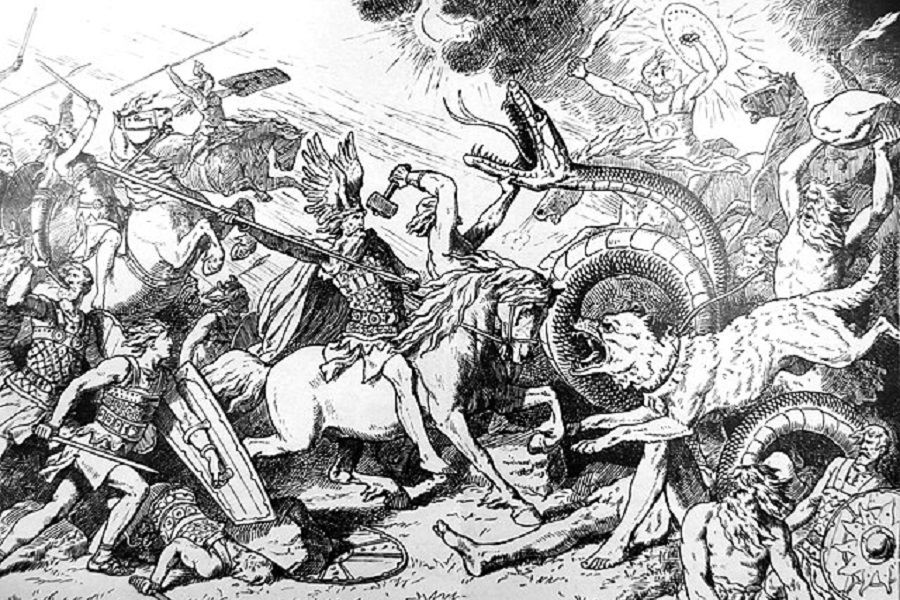Very little is known about Magni and Modi, the mighty sons of Thor from Norse mythology. Most people would not even be aware of their names. Unlike their illustrious father, they have not really made their way into the popular imagination. What we do know about them is that they were both great warriors. They were heavily associated with battle and warfare. And they were also believed to have wielded the famous Mjolnir, Thor’s hammer.
Who Were Magni and Modi?

Magni and Modi were two gods from the large pantheon of Norse gods and goddesses. They were either full brothers or half brothers. The identity of their mothers cannot be agreed upon by scholars but their father was Thor, the god of thunder. Magni and Modi were part of the Aesir of Norse mythology.
The two brothers’ names mean ‘wrath’ and ‘mighty.’ Thor also had a daughter named Thrud, whose name meant ‘strength.’ These three together were supposed to symbolize the different aspects of their father and the kind of being he was.
Their Position in the Norse Pantheon
The two brothers, Magni and Modi, were an important part of the Norse pantheon. As the sons of Thor and able to wield his mighty hammer, they were prophesied to lead the gods to an era of peace after Ragnarok. They would give the other gods the courage and the strength to survive the twilight of Norse mythology. As such, it is perhaps strange that we know as little about them as we do. One would think that a new generation of leaders, and the mighty Thor’s sons at that, would warrant more sagas and legends.
Mightiest of the Aesir
Both Magni and Modi belonged to the Aesir. The Aesir were the gods of the primary pantheon of Norse mythology. The ancient Norse people had two pantheons, unlike many other pagan religions. The second and less important of the two was the Vanir. The Aesir and the Vanir were always engaged in war and would periodically take hostages from each other.
Magni was considered the strongest of the Aesir, because of his rescue of Thor from a giant when he was only a baby. He was associated with physical strength, which is attested by his name and the meaning behind it.
Magni: Etymology
The name Magni comes from the Old Norse word ‘magn’ meaning ‘power’ or ‘strength.’ Thus, his name is usually taken to mean ‘mighty.’ He was given this name because he was generally considered to be among the strongest of the Aesir gods physically. A variation on the name Magni is Magnur.
Magni’s Family
Magni’s father was confirmed to be Thor, according to Norse kennings. This is not directly stated in any myths but the kennings are actually vital sources of information about the Norse deities. In Hárbarðsljóð (The Lay of Hárbarðr – one of the poems of the Poetic Edda) and in a verse of Thorsdrapa (The Lay of Thor) by Eilífr Goðrúnarson, a reference is made to Thor as ‘Magni’s Sire.’ However, the identity of his mother is still in question.
Mother
Most scholars and historians, including the Icelandic historian Snorri Sturluson, agree that the mother of Magni was Járnsaxa. She was a giantess and her name means ‘iron stone’ or ‘iron dagger.’ It is no wonder that her son by Thor was the strongest of the Norse gods.
Járnsaxa was either the lover or wife of Thor. As Thor already had another wife, Sif, this would make Járnsaxa the co-wife of Sif. There is some confusion about the specific wording of a particular kenning in the Prose Edda. According to that, Sif may have herself been known as Járnsaxa or as the ‘rival of Járnsaxa.’ However, since it is widely accepted that Járnsaxa was a jötunn or giant, it is unlikely that Sif and Járnsaxa were the same person.

Siblings
As the son of Thor, Magni had siblings on his father’s side. He was the eldest of two sons. Modi was either his half-brother or full-brother, depending on different scholars and interpretations. Thor’s daughter Thrud was his half-sister, the daughter of Thor and Sif. Her name was often used to signify female chieftains in Norse kennings.
What is Magni the god of?
Magni was the god of physical strength, brotherhood, health, and family loyalty. Devotion to family was an important aspect of this particular Norse god, given his loyalty to his father and brother.
The animal associated with Magni was the pine marten. He was also the subsequent master of Gullfaxi, the giant Hrungnir’s horse. Gullfaxi was only second to Odin’s horse Sleipnir in speed.
Modi: Etymology
Modi is the anglicized version of the name Móði. It was probably derived from the Old Norse word ‘móðr’ which means ‘wrath’ or ‘excitement’ or ‘anger.’ Another possible meaning for the name may have been ‘courage.’ If the former, it might have meant the righteous fury or rage of the gods. This is not the same as the human idea of unreasonable anger, which has a negative connotation attached to it. Variations of his name are Modin or Mothi. It is still a commonly used Icelandic name.
Modi’s Parentage
Just like Magni, we found out that Thor is the father of Modi via a kenning, in the poem Hymiskviða (The Lay of Hymir) from the Poetic Edda. Thor is referred to as ‘Father of Magni, Modi, and Thrudr,’ along with a host of other epithets. This does not make it any clearer who the mother of Modi is.
Mother
Modi is even less present in Norse mythology than his brother. Thus, it is very difficult to make out who his mother was. She is not mentioned in any of the poems. Many scholars assume that it was the giantess Járnsaxa. Since Magni and Modi are mentioned together so often, it makes sense that they had the same mother and were full brothers.
However, other sources speculate that he was the son of Sif instead. This would make him the half-brother of Magni and the full-brother of Thrud. Or, if the interpretation that Járnsaxa and Sif were different names for the same person is correct, the full brother of Magni.
At any rate, what we do know is that Modi did not seem to possess the same kind of physical strength that Magni did. This might hint at a different lineage but it could also just be their individual traits and characteristics.
What is Modi the God Of?
Modi was the god of bravery, brotherhood, combat, and fighting ability, and the god that was said to inspire berserkers. Berserkers, as per Norse mythology, were those warriors who fought in a trance-like fury. It has given rise to the modern English term ‘berserk’ which means ‘out of control.’
These particular warriors were said to have fits of manic energy and violence during a battle. They behaved in the manner of animals, howling, frothing at the mouth, and gnawing at the edges of their shields. They were completely out of control in the heat of battle. The name ‘berserker’ probably comes from the bear skins that they wore during battle.
It is fitting that the Norse god whose name meant ‘wrath’ was the one who patronized and watched over these ferocious berserkers.

Inheritors of Mjolnir
Both Magni and Modi could wield the legendary Mjolnir, their father Thor’s hammer. It was foretold by the giant Vafþrúðnir to Odin that Magni and Modi would survive the Ragnarok that would spell the end of gods and men. Thus, they would inherit Mjolnir, the hammer of Thor, and use their strength and courage to build a new world of peace. They would inspire the survivors to bring about an end to warfare and lead them into the future.
Magni and Modi in Norse Myth
The myths about Magni and Modi were few and far between. Apart from the fact that they both survived Ragnarok after Thor’s death, the most important story we have is Magni’s rescue of Thor when he was just a baby. Modi is not featured in this story and one might wonder if he had even been born at the time.
In Poetic Edda
The two brothers are mentioned in Vafþrúðnismál (The Lay of Vafþrúðnir), the third poem of the Poetic Edda. In the poem, Odin leaves his wife Frigg behind to seek out the home of the giant Vafþrúðnir. He visits the giant in disguise and they have a contest of wisdom. They ask each other many questions about the past and present. Ultimately, Vafþrúðnir loses the contest when Odin asks him what the great god Odin whispered into the ear of his dead son Baldr when the latter’s body lay on the funerary ship. As only Odin could have known the answer to this question, Vafþrúðnir becomes aware of who his guest is.
Magni and Modi are mentioned by Vafþrúðnir as the survivors of Ragnarok and the inheritors of Mjolnir during this game. In Norse mythology, Ragnarok is the doom of the gods and men. It is a collection of natural disasters and great battles that will result in the deaths of many of the gods, like Odin, Thor, Loki, Heimdall, Freyr, and Tyr. Ultimately, a new world will rise from the ashes of the old one, cleansed and repopulated. In this new world, Odin’s dead sons Baldr and Hodr will rise again. It shall be a new beginning, fertile and peaceful.

In Prose Edda
Modi is not mentioned in any of the Norse poems or myths any further. But we do have one additional story about Magni in the Prose Edda. In the book Skáldskaparmál (The Language of Poetry), the second part of Prose Edda, there is the tale of Thor and Hrungnir.
Hrungnir, a stone giant, enters Asgard and declares that his horse Gullfaxi is faster than the horse of Odin, Sleipnir. He loses the wager when Sleipnir wins the race. Hrungnir becomes drunk and disagreeable and gods grow tired of his behavior. They tell Thor to battle against Hrungnir. Thor defeats the giant with his hammer Mjolnir.
But in his death, Hrungnir falls forward against Thor. His foot comes to rest against Thor’s neck and the god of thunder cannot get up. All the other gods come and try to free him from Hrungir’s foot but cannot. Finally, Magni comes up to Thor and lifts the giant’s foot off his father’s neck. He was only three days old at the time. As he frees his father, he says that it is a pity he had not come earlier. Had he arrived on the scene earlier, he could have struck down the giant with one fist.
Thor is very pleased with his son. He embraces him and declares that surely he will become a great man. He then promises to give Magni Hrungir’s horse Gullfaxi or Gold Mane. This is how Magni came to possess the second-fastest horse in Norse mythology.
This act of Thor displeased Odin very much. He was angry that Thor had given such a kingly gift to the son of a giantess instead of giving it to his father, Odin, the King of the Norse Gods.
There is no mention of Modi in this story. But Magni is often likened to Odin’s son Vali who also had a giantess for a mother and committed a great deed when he was only days old. In Vali’s case, he killed the blind god Hoder in revenge for the death of Baldr. Vali was only one day old at the time.
Magni and Modi in Pop Culture
Interestingly enough, one of our largest sources of information about these particular gods is in the world of pop culture. This is because they both appear in the God of War game. Maybe this should not be such a surprise. After all, Norse mythology and Thor himself have become popular once again largely due to the Marvel Cinematic Universe and the comic books. If people around the world only came to know the great god of thunder because of these films, it makes sense that they would know nothing about his more obscure sons.
Mythology can be created and elaborated in many ways, because of stories and local folktales and by word of mouth. There is no knowing what is true or false where mythology is concerned. There can be as many myths as the people who come up with them. Perhaps, in later years, the God of War games can be credited with adding to and detailing out Norse mythology.

In God of War Games
In the God of War games, Magni and Modi are considered antagonists. The sons of Thor and Sif, Magni is the older one while Modi is younger than him. While they were still children, the two of them managed to rescue their father Thor from under the body of the stone giant Hrungnir, after Thor had killed him. However, only Magni was given the credit for this deed since he was more blonde and he was the only one who had been noticed, by Odin’s advisor Mimir.
Magni was the favorite son of his father while Modi was treated as the younger and lesser son. This gave rise to feelings of bitterness and resentment in Modi since he felt like he was just as powerful and important as his brother. He constantly tried to prove that he was more capable of wielding Thor’s hammer Mjolnir than his brother. Despite these feelings, Magni and Modi were still often found on the same side of different wars and battles. The brothers were rivals but also loved each other deeply. In the Aesir-Vanir war, the two brothers together managed to defeat and kill the Vanir goddess Nerthus.
In the God of War games, Magni and Modi were in league with their uncle Baldur against the protagonist Kratos and his son Atreus. Magni was the more courageous and confident of the two. He was killed by Kratos while Modi was killed by Atreus after the defeat and death of his brother.
How far the mythology in the God of War games matches up with actual Norse mythology is unknown. Magni and Modi are rather obscure gods, about whom very little information is available. The tale about Hrungnir is almost certainly part of Norse mythology since it is what led to Magni getting his famed horse. Whether Modi was present at the incident remains less clear.
The tale of the deaths of Magni and Modi at the hand of Kratos and Atreus is not true. Indeed, it destroys the entire Ragnarok myth. It was made clear that they would survive Ragnarok and inherit Thor’s hammer, in order to bring an end to violence and killing. Thus, we must take popular culture references like this with a grain of salt. However, since they are the window through which a lot of people now view mythology, it is unwise to dismiss them altogether.